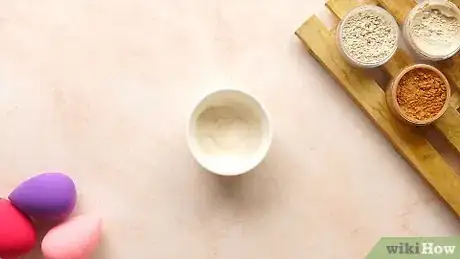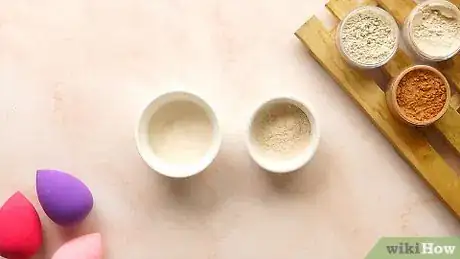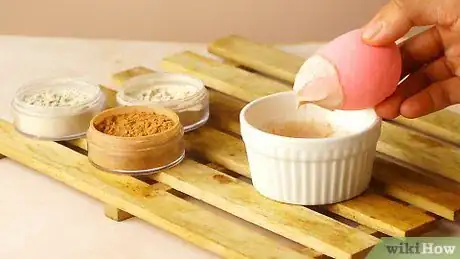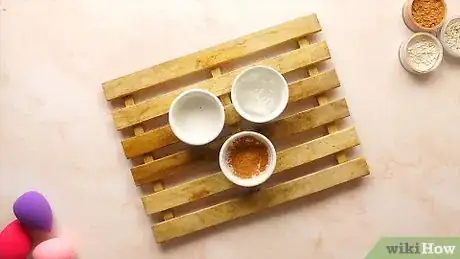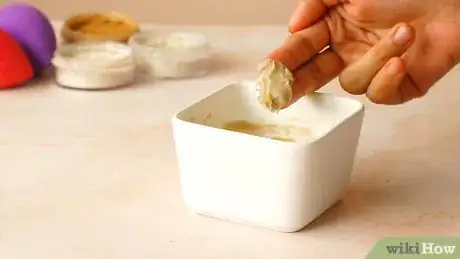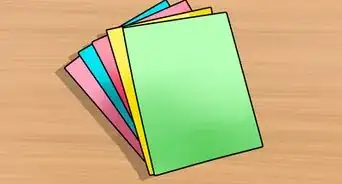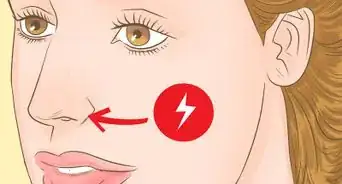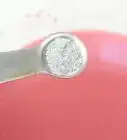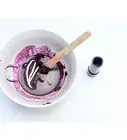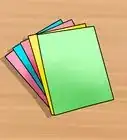This article was co-authored by Shara Strand. Shara Strand is a Makeup Artist and the Founder of Shara Makeup Studio, a makeup and image consulting studio based in New York City. She has over 15 years of image and makeup consulting experience including working as a regional artist for Bare Escentuals and Estee Lauder, Saks 5th Avenue, Bloomingdales, and Bergdorf Goodman. Her work has been featured in WNBC, Fox 5, Direct TV ABC morning news, and Hamptons Magazine. She is the creator of Shara Cosmetics and is a two time Billboard charted singer. She holds a BFA from New York University.
wikiHow marks an article as reader-approved once it receives enough positive feedback. This article has 12 testimonials from our readers, earning it our reader-approved status.
This article has been viewed 484,723 times.
You may want to make your own concealer because you've run out of conventional concealer, or because you want to move away from pore-clogging commercial products. There are a variety of methods and recipes. Mix and match ingredients based on comfort, availability, and consistency.
Steps
Moisturizer and Powder
-
1Use moisturizer as a base. To begin, squeeze a small amount of moisturizer into your hand or a small container. If possible, use moisturizer that is non-comedogenic: that will not cake onto your skin and create acne.
- Some moisturizer products will cake onto your skin and clog your pores, creating an ideal environment for acne. If you tend to get acne, then a non-comedogenic moisturizer might truly be a wiser choice.
-
2Mix in powder that matches your skin tone. If you don't have the exact color, add lighter and darker powder until you have a mixture that is thick and opaque enough to serve as a concealer.Advertisement
-
3Aim for about equal parts powder and moisturizer. You may need to go through a bit of trial and error to get the proportions right.
- Alternatively, look for tinted moisturizer. You may be able to find a moisturizer product that matches your skin tone, which will remove the need to color the concealer.
-
4Apply it to your skin. Use the homemade concealer in the same way that you would a store-bought product. Don the concealer into the spot that you want to cover up, and feel free to use more if the first dollop isn't enough. Use your finger or a brush. You may find that a small, clean concealer brush affords you a bit more precision and yields better results than just a finger. It's also more sanitary.[1]
Natural Oils and Ingredients
-
1Get creative. Don't be afraid to mix various natural oils, pigments, and thickening agents. You don't need to use commercial moisturizers and synthetic chemical products. Research the effects and interactions of the various ingredients before you put them onto your skin!
-
2Choose your oils. Poke around a local apothecary, drugstore, or health-food store for good candidates. Consider adding vitamins and supplements for added effect. Vitamin E, for instance, can help the skin heal more quickly.
- Rosehip oil and sea buckthorn oil are supposed to help fight acne.[2]
- Argan oil can help heal your skin and prevent signs of aging.
-
3Thicken the mixture. Use beeswax; cocoa butter; cupuacu butter; shea butter; aloe vera gel; and/or a vegetable-based emulsifying wax. Each thickening agent has its own unique properties, but they are largely interchangeable when it comes to concealing.[3] Look for recipes that use a specific mix of butters, oils, and herbs.
-
4Mix your colors. You can buy pure pigment at beauty-supply stores. Try to get a pigment that matches your skin tone. If you can't find something that fits, a beauty professional might be able to help you pick the right pigments to mix together.[4]
Vaseline and Pressed Powder
-
1Use Vaseline as the base. Any petroleum jelly will do. A little bit of Vaseline goes a long way, so try not to use too much. Scoop a glob of Vaseline into a small bowl or the palm of your hand.
-
2Add pressed powder. Mix thoroughly. Powder helps to set foundation and concealer, which can be useful when you're working with something as oily and viscous as Vaseline.[5] Try to use crushed-up pressed powder, as it is easier to mix and transport than loose powder. If you use loose powder, however, you might be able to get a bit more coverage out of your concealer.
-
3Apply to the spot you want to cover. This do-it-yourself concealer will probably not be as effective as most commercial products, but it should hold you over in a pinch.
Expert Q&A
Did you know you can get expert answers for this article?
Unlock expert answers by supporting wikiHow
-
QuestionWhat ingredients are in concealer?
 Shara StrandShara Strand is a Makeup Artist and the Founder of Shara Makeup Studio, a makeup and image consulting studio based in New York City. She has over 15 years of image and makeup consulting experience including working as a regional artist for Bare Escentuals and Estee Lauder, Saks 5th Avenue, Bloomingdales, and Bergdorf Goodman. Her work has been featured in WNBC, Fox 5, Direct TV ABC morning news, and Hamptons Magazine. She is the creator of Shara Cosmetics and is a two time Billboard charted singer. She holds a BFA from New York University.
Shara StrandShara Strand is a Makeup Artist and the Founder of Shara Makeup Studio, a makeup and image consulting studio based in New York City. She has over 15 years of image and makeup consulting experience including working as a regional artist for Bare Escentuals and Estee Lauder, Saks 5th Avenue, Bloomingdales, and Bergdorf Goodman. Her work has been featured in WNBC, Fox 5, Direct TV ABC morning news, and Hamptons Magazine. She is the creator of Shara Cosmetics and is a two time Billboard charted singer. She holds a BFA from New York University.
Makeup Artist
-
QuestionCan I use regular lotion as the moisturizer? Or is it just best to use actual moisturizer?
 AskpipaCommunity AnswerYou can use any creme that is non-scented and that won't give you acne or spots.
AskpipaCommunity AnswerYou can use any creme that is non-scented and that won't give you acne or spots. -
QuestionHow long can concealer be stored and should it be kept in the refrigerator?
 Community AnswerMost can be stored for a month or two and, by keeping it refrigerated, it won't go runny.
Community AnswerMost can be stored for a month or two and, by keeping it refrigerated, it won't go runny.
Warnings
- Make sure you do not put a load of powder or moisturizer on. This can be your permanent concealer.⧼thumbs_response⧽
- Carefully use the suggested concealer with Vaseline for a short period of time because Vaseline clogs skin and leaves it oily. For an alternative you could use face moisturiser and make sure it's face moisturiser and not body moisturiser or lotion because it could possibly clog your skin if it's meant for the body and not for the face. If you use face moisturiser instead of Vaseline, it will promise soft skin and less clogged or oily skin.⧼thumbs_response⧽
References
- ↑ https://www.youtube.com/watch?v=APJWkn7BByk
- ↑ http://www.humblebeeandme.com/diy-healing-concealer/
- ↑ https://wellnessmama.com/beauty/natural-concealer-highlighter/
- ↑ http://www.lisaliseblog.com/2013/04/making-make-up-cream-concealer.html
- ↑ http://www.theloop.ca/how-to-make-your-own-beauty-products-with-vaseline/
- Videos provided by SofiaStyled
About This Article
If you want to make concealer out of makeup you already have, start by squeezing a small amount of moisturizer into a small container. Since some moisturizers can clog pores, opt for a one that is non-comedogenic if you tend to get acne easily. With your moisturizer squeezed out, add in an equal amount of powder that matches your skin tone and stir until they are mixed. Once your concealer is mixed evenly, apply it to your skin with your finger or a clean concealer brush. Don’t be afraid to get creative with your concealer by adding oils. For example, mix in a couple drops of rosehip oil to help fight acne. For more help, including how to make concealer from Vaseline and powder, read on!
